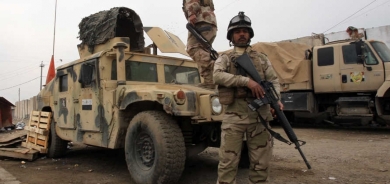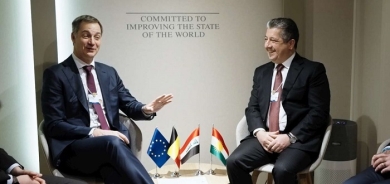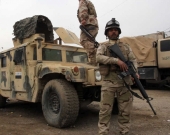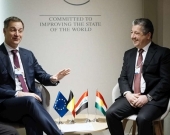Iraq conflict: U.S. hits more ISIS targets as Yazidi 'mass graves' reported

U.S. Central Command says the strikes were spread out, with three before noon ET on Saturday and one about 3 p.m.
The military says indications suggest that the strikes were successful in destroying the armoured vehicles.
Displaced people from the minority Yazidi sect, fleeing the violence in the Iraqi town of Sinjar west of Mosul, take refuge at Dohuk province on August 7. ISIS militants extended their gains in northern Iraq on Thursday, seizing more towns and strengthening a foothold near the Kurdish region.
Freelance reporter Hermione Gee told CBC News from Erbil that humanitarian aid was being stepped up, with the U.S., Turkey and the U.K. helping with airdrops on a mountain where tens of thousands of Yazidis have been stranded upon fleeing fighters with ISIS, which also goes by the name the Islamic State.
Asked if the U.S. airstrikes were making a difference for the Yazidis, Gee said one strike overnight at militants in Sinjar who were firing at the group were "taken out," restoring some calm.
Gee said she was with Kurdish forces about 30 kilometres from Eribl on Saturday, and she was told things were "peaceful" following the Thursday and Friday night airstrikes because heavy weaponry operated by ISIS was destroyed.
Buried alive
The international community has expressed concern that the Yazidis trapped on the Sinjar mountain range in northeast Iraq are running out of food and water. Hundreds of women from the minority religious community have already been taken captive by Sunni militants.
On Sunday, Iraqi human rights minister Mohammed Shia al-Sudani told Reuters said the Sunni militants had also buried alive some of their victims, including women and children. Some 300 women were kidnapped as slaves, he added.
"We have striking evidence obtained from Yazidis fleeing Sinjar and some who escaped death, and also crime scene images that show indisputably that the gangs of the Islamic States have executed at least 500 Yazidis after seizing Sinjar," Sudani told Reuters.
Sinjar is the ancient home of the Yazidis, one of the towns captured by the Sunni militants who view the community as "devil worshippers."
"Some of the victims, including women and children were buried alive in scattered mass graves in and around Sinjar," Sudani said.
The Islamic State, which has declared a caliphate in parts of Iraq and Syria, has prompted tens of thousands of Yazidis and Christians to flee for their lives during their push to within a 30-minute drive of the Kurdish regional capital Arbil.
Deadline passes for religious conversion
The Yazidis, followers of an ancient religion derived from Zoroastrianism, are spread over northern Iraq and are part of the country's Kurdish minority.
A deadline passed at midday on Sunday for 300 Yazidi families to convert to Islam or face death at the hands of ISIS. It was not immediately clear whether the Iraqi minister was talking about the fate of those families or others in the conflict.
Yazidi minority singled out for hatred for long time
The militant group, which arrived in northern Iraq in June, has routed Kurds in its latest advance, seizing several towns, a fifth oilfield and Iraq's biggest dam — possibly gaining the ability to flood cities and cut off water and power supplies.
'Our government is consulting with like-minded countries to determine how Canada will continue to support the humanitarian needs of Iraqi civilians'- Alex Asselin, Department of Foreign Affairs spokesperson
A spokesperson with Canada's Department of Foreign Affairs told CBC, "Canada condemns in the strongest possible terms ISIS terrorists' repugnant killing of innocent civilians in northern Iraq, including women and children, Christian, Yazidi and other religious communities."
"Our government is consulting with like-minded countries to determine how Canada will continue to support the humanitarian needs of Iraqi civilians," Alex Asselin said in an email late Saturday.
Iraq children Nineveh
Asselin said that since the beginning of this year, Canada has provided over $16 million to respond to humanitarian needs in Iraq, of which $6.8 million was for populations affected by civil unrest and $9.6 million for Syrian refugees.
As of June 2014, Iraq has been on the list of Canada's development country partners, enabling further support, he said.
Obama justified the U.S. military's return to fighting in Iraq on Saturday by saying America must act now to prevent genocide, protect its diplomats and provide humanitarian aid to the trapped Yazidi refugees.
"This is going to be a long-term project" that won't end and can't succeed unless Iraqis form an inclusive government in Baghdad capable of keeping the country from breaking apart, Obama said.
But the help comes too late for many of the religious minorities targeted for elimination by the Islamic State group, which swept past U.S.-trained and equipped Iraqi government forces in recent weeks and now controls much of Iraq.
A delayed response by the Shia-led government in Baghdad left Kurdish forces struggling to contain the Sunni extremists' advances.
The UN said more than 500,000 people have been displaced by the violence in Iraq since June, bringing this year's total to well over one million.
CBC News, The Associated Press














